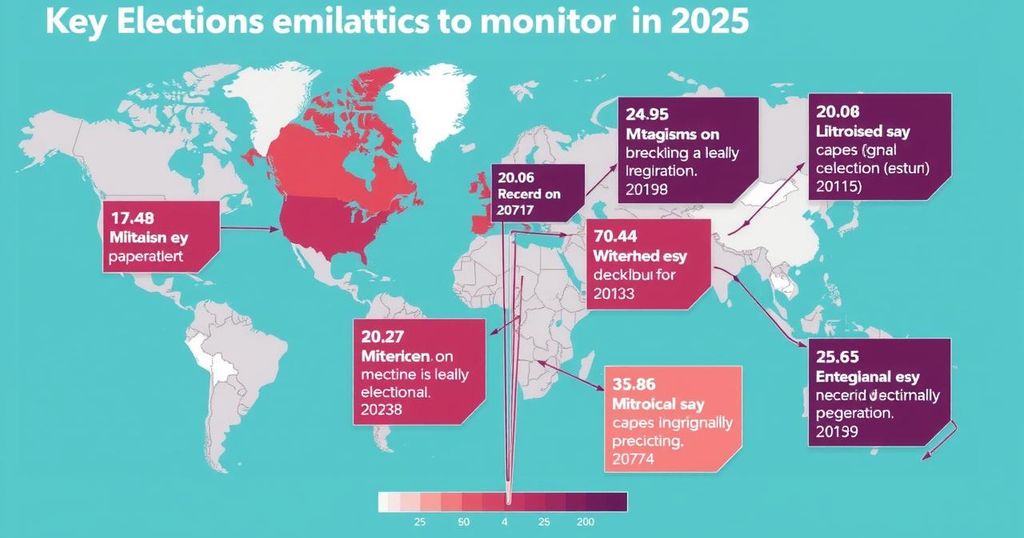World news
2024 ELECTIONS, ASIA, BASHA, BELARUS, BUNDESTAG, CANADA, CHRISTIAN DEMOCRATS, ELECTIONS, EUROPE, EUROPEAN UNION, FREE DEMOCRATS, FRIEDRICH MERTZ, GERMANY, GREEN PARTY, LU, LUKANSHENKO, LUKASHENKO, NATIONAL ASSEMBLY, NORTH AMERICA, PARLIAMENTARY SEATS, POLITICS, SOCIAL DEMOCRATS, SYRIA
Fatima Alavi
0 Comments
Key Elections to Monitor in 2025 Around the World
In 2025, at least 12 global elections are confirmed, notably in Belarus, Germany, Canada, Australia, and Egypt. Each election represents pivotal moments for incumbents like Alexander Lukashenko and Justin Trudeau, who face significant challenges. The outcomes could influence national policies and international relations, with shifting political dynamics in play across the globe.
The year 2025 is anticipated to be significant in global politics, with at least 12 elections confirmed, alongside potential additional contests in unstable regions. Among the critical elections to observe are those in Belarus, Germany, Canada, Australia, and Egypt. These elections not only reflect the political nuances within each nation but may also influence broader geopolitical dynamics as incumbent leaders face viable challengers.
In Belarus, voters will participate in a presidential election on January 26, wherein incumbent President Alexander Lukashenko aims for a seventh term amidst opposition turmoil. Historically, Lukashenko has maintained control since 1994, casting doubt on the fairness of the electoral process, especially following the controversial 2020 election that saw mass protests against his regime.
Germany’s federal elections are scheduled for February 23, where citizens will elect 630 Bundestag members. The current coalition’s collapse has prompted this election, with Chancellor Olaf Scholz’s Social Democrats facing stiff competition from the Christian Democrats and the far-right Alternative for Germany party. The election’s outcome will determine the composition of the next coalition government.
In Canada, parliamentary elections are expected by October 20, 2025. Prime Minister Justin Trudeau is struggling with low approval ratings against Conservative leader Pierre Poilievre, who leads in the polls. With potential challenges for Trudeau’s government, the timeline for elections could vary depending on political developments.
Australia will have two crucial election days, one on May 17 for Senate seats and another by September 27 for the House of Representatives. Incumbent Prime Minister Anthony Albanese faces declining popularity, while opposition leader Peter Dutton is gaining traction, signaling a potential shift in power.
Finally, Egypt’s parliamentary and senate elections are set to occur by December 2025 amid a constrained political environment, where President Abdel Fattah el-Sisi faces little opposition following the jail sentences of possible rivals. The outcome of these elections will be pivotal in determining Egypt’s political landscape moving forward, especially given Sisi’s recent re-election to a third term.
The events leading up to the 2025 elections reveal a tapestry of political contention and transition across various countries. In recent years, many nations have experienced shifts in leadership, often driven by voter dissatisfaction towards long-standing incumbents. The global electoral scene in 2025 will be closely monitored, particularly as elections in Belarus, Germany, Canada, Australia, and Egypt promise to reshape national policies and possibly international relations. Contextualizing these elections requires an understanding of their historical significance and the reaction of the electorates to current governance.
The elections scheduled for 2025 play a critical role in shaping the political landscapes of Belarus, Germany, Canada, Australia, and Egypt. Each nation’s upcoming electoral process presents a moment for citizens to influence their governance amid varying degrees of political strife and dissatisfaction. The outcomes could signal shifts in power, with incumbents facing robust opposition amidst calls for reform, reflecting broader trends within world democracies.
Original Source: www.usnews.com




Post Comment